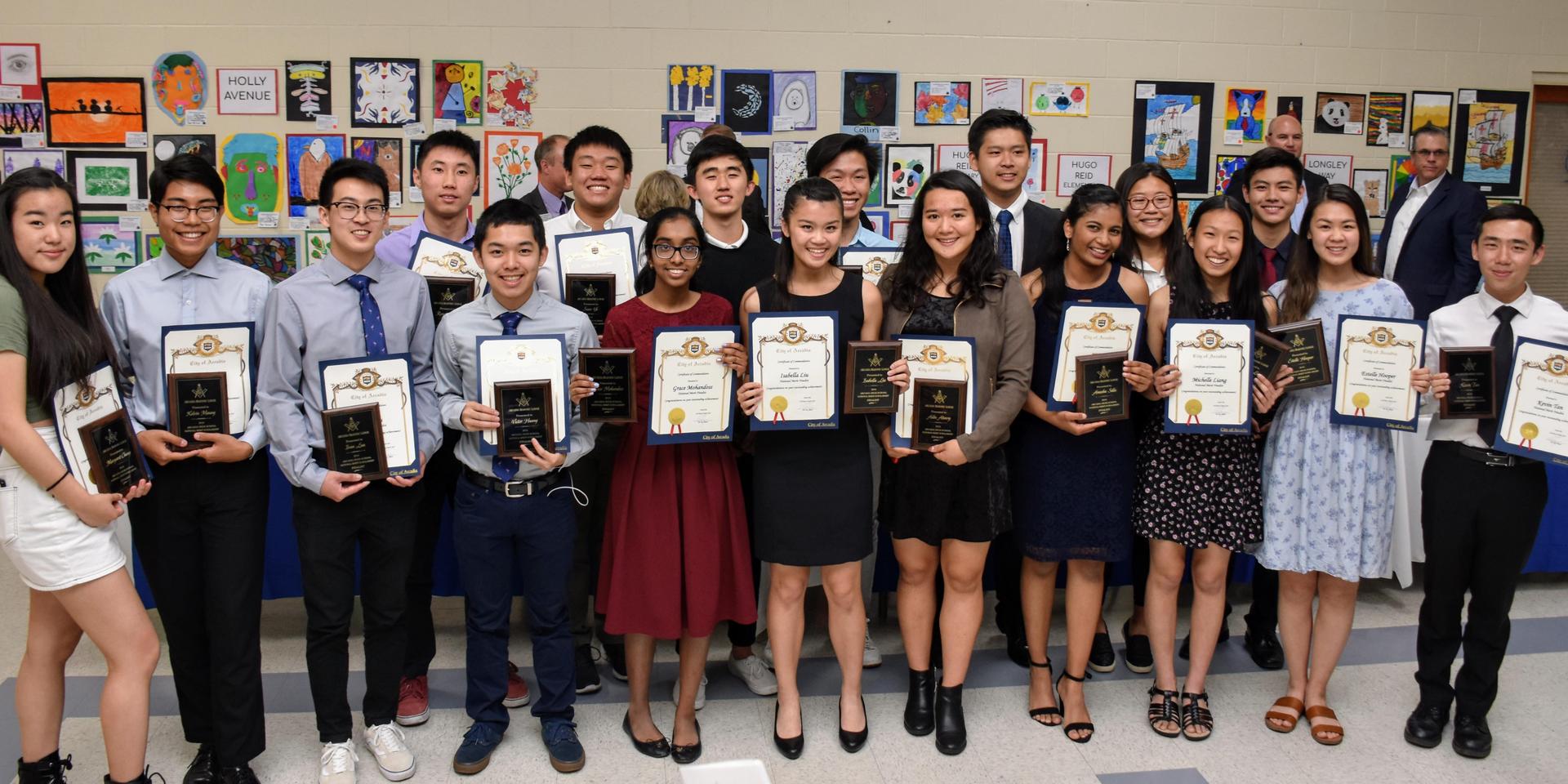How to Become an Arcadia High National Merit Semifinalist
By Arcadia Unified School District Digital Communications Intern Sofia Nagy

Arcadia High’s 2019 National Merit Scholarship Finalists
Over the past 25 years, Arcadia High School has had nearly 600 students, qualify as National Merit Scholarship Semifinalists, with an exceptional average of 20 students receiving admittance into this program. This year, Arcadia High’s Class of 2019 had 23 Apache semifinalists.
The National Merit Scholarship Program is a prestigious academic competition recognizing students who scored the highest scores on the Preliminary SAT/National Merit Scholarship Qualifying Test (PSAT/NMSQT). Annually, there are roughly 1 million students who sit for this exam. The top 1.5% of test-takers become National Merit Scholarship Semifinalists. Students are invited to continue on this program by completing additional information, with about 90% of semifinalists moving on as National Merit Scholarship Finalists. According to the National Merit Scholarship program website, scholarship-winning students “are chosen from the Finalist group based on their abilities, skills, and accomplishments.”
While there is a wealth of information about how the program works, there is one question many parents and students alike query: How does a student earn a high enough score on the PSAT/NMSQT to become a Semifinalist, Finalist, or a scholarship-winner in this lauded program?

Arcadia High’s Class of 2019 Lucia Cheng
“I took the PSAT freshman, sophomore, and junior year. I went to Elite during the summer of junior year to study, so when school rolled around, I had a better understanding of the test questions. The PSAT/SAT is extremely formulaic. That's why it honestly just takes lots of practice and repetition,” said Lucia Cheng, 2019 Arcadia High National Merit Scholarship Finalist.

Apache Class of 2019 Margaret Chang
“I took the PSAT/NMSQT freshman, sophomore, and junior year. The first time was for experience's sake. I had no idea what the test was going to look like,” said Margaret Chang, 2019 Arcadia High National Merit Scholarship winner. “Taking the PSAT/NMSQT was a requirement sophomore year; however, I took it more seriously this time around. I took a couple practice tests leading up to the actual thing. Then, I decided to take my shot at the scholarship and do the process again my junior year. You should definitely take a practice test to determine where your weaknesses are before testing.”

2019 Arcadia High National Merit Scholarship Winner Michael Huang
“I took the PSAT from freshman to junior year to get some practice. I didn't really study for the PSAT specifically, but I consider the extra practice from doing a couple of practice SAT exams helped me better prepare myself for the structure of these tests,” said Michael Huang, 2019 Arcadia High National Merit Scholarship winner.
When thinking of the PSAT/NMSQT, parents and students tend to focus on how this test score could impact post-high school, collegiate plans. However, while in this process, it is overlooked that “grades and scores are definitely not everything,” Cheng said. “Creating a cohesive [college] application is extremely important because you're attempting to show the best of yourself. When figuring out what you want, try to see what kind of person you want to become”.
“During high school, I was part of Speech and Debate, Math Team, Quiz Bowl, Mock Trial, Gavel Club, and Government Team. This helped me test and build my capabilities but never felt too overwhelming,” shared Huang. “It’s completely unnecessary to stress about selecting a career path too early on. Take your time to experiment with different activities”.
Based on the advice from each of these impressive students, there seem to be many commonalities related to both obtaining a high score on the PSAT/NMSQT and realizing overall success and personal growth: practice, repetition, beginning early, experimenting with different studying strategies and introspection. Ultimately, and perhaps the most powerful action a student can take in this process is what Cheng did: “I can take a leap of faith to be the best version of myself that I can be.”